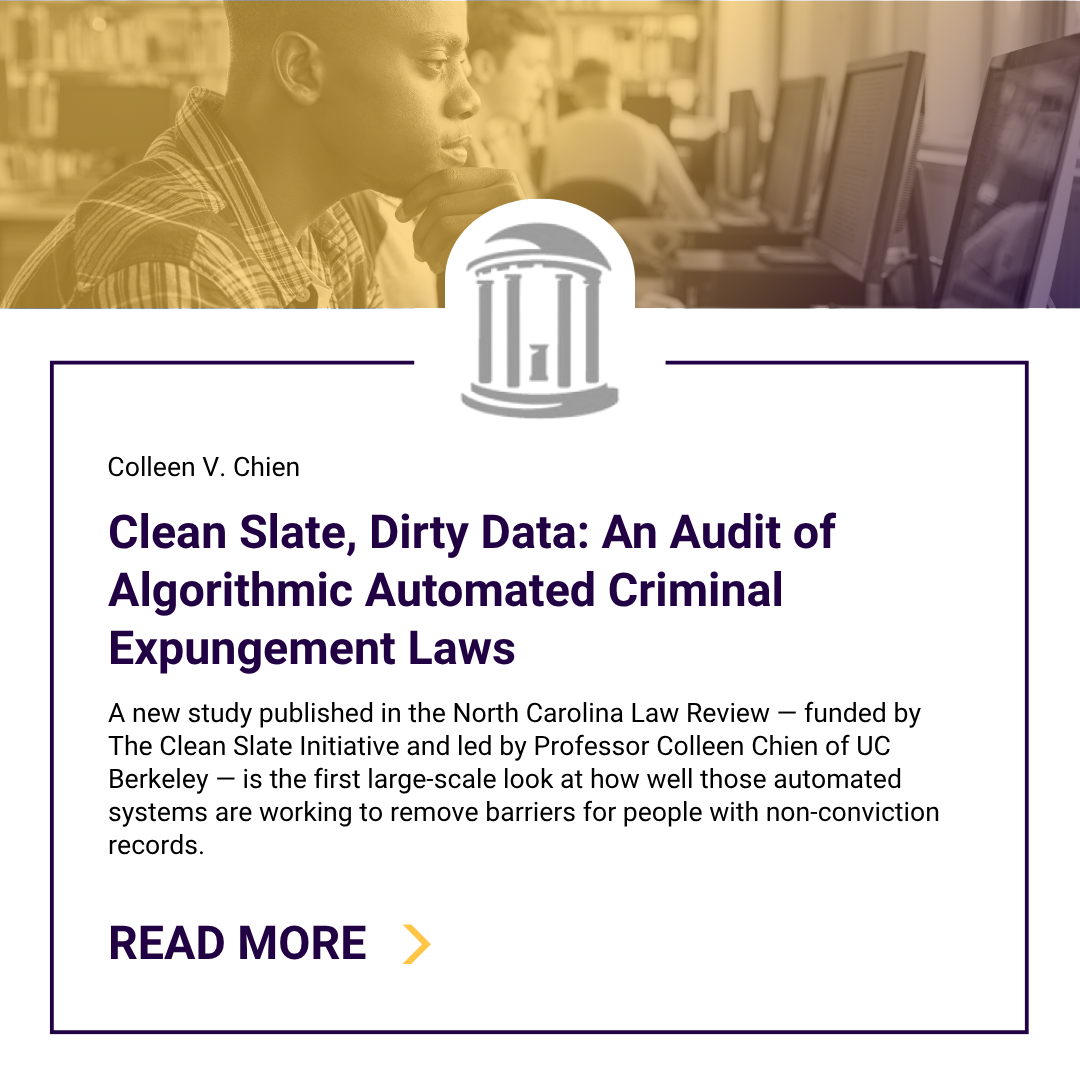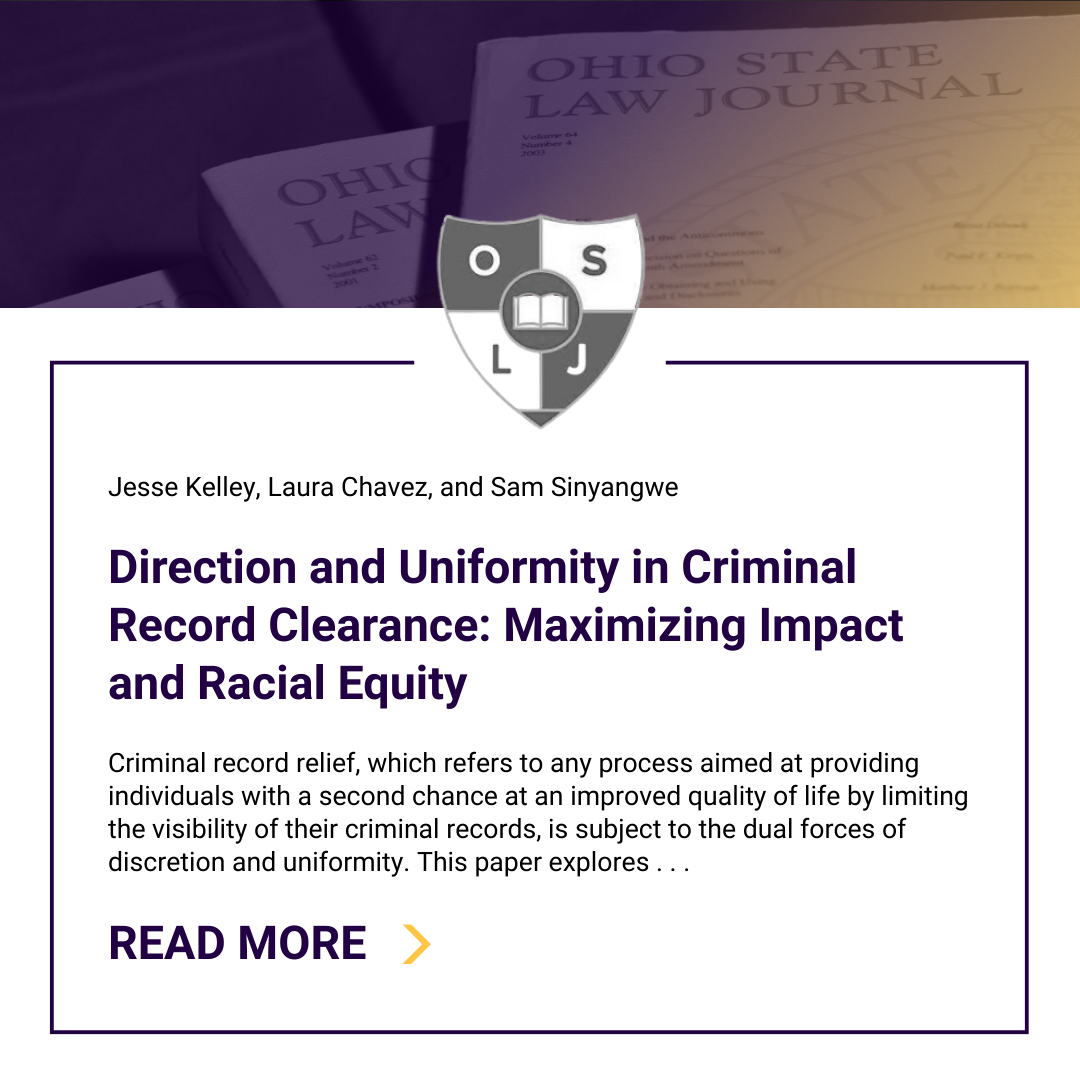Clean Slate Resource Library
Our resource library features information for advocates, stakeholders, and lawmakers, research on Clean Slate policies, and videos relating to our work.







WHM Webinar Trailblazers and Triumphs
The webinar featured The Clean Slate Initiative’s CEO, Sheena Meade, joined by Amanda Renteria - CEO of Code for America, Dr. Topeka K. Sam - Founder of The Ladies of Hope Ministries, Lenore Anderson - Co-Founder and President of The Alliance for Safety & Justice, and Hillary Blout - Founder and Executive Director of For The People, for an interactive conversation about their advocacy work, experiences as women in leadership, and more.
The Clean Slate Initiative's Data Dashboard Launch Webinar
Our data dashboard provides a comprehensive, in-depth look at state-level data, offering insights into the estimated number of people with records and the potential impacts of Clean Slate legislation.
This webinar shares our methodology and shows how this tool can support policy-making.
Sheena Meade's Press Conference Remarks on the Clean Slate Act and the Fresh Start Act
Sheena Meade, executive director of the Clean Slate Initiative, joined other advocates and a bipartisan group of co-sponsors to highlight the economic and community safety benefits of two commonsense criminal justice reforms advancing through Congress.
Sheena Meade on CNN This Morning
The Clean Slate Initiative's CEO, Dr. Sheena Meade on CNN This Morning.
Second Chances Make Our Communities Safer
A past arrest or conviction record should not be a life sentence to poverty and hopelessness. One in three adults in America today have some kind of past record that is a barrier to jobs, housing, and/or other avenues to economic mobility.
Second Chance Stories: All About Clean Slate Delaware
Clean Slate is about second chances. Now that the Clean Slate bills have passed in Delaware, we're focused on helping the 290,000 people living with a Delaware record access the second chance they're entitled to through SB 111 and SB 112. Learn more about Clean Slate and how to get involved in expanding access to second chances at bit.ly/CleanSlateDE.
Brennan Center Analyzes the Success of New York’s Clean Slate Campaign
Despite political challenges and years of debate over key provisions, advocates and legislators built broad support for Clean Slate in New York by balancing bold reform goals with practical compromise. Their success offers valuable lessons for advancing Clean Slate policies in other states.
Learn more in this analysis from The Brennan Center for Justice's Ames Grawert and Hernandez D. Stroud.
Clean Slate Communicators Guide
An advocacy tool for Clean Slate campaigns to help craft clear and compelling communications that will raise awareness, build understanding, and inspire action.
Information for Lawmakers
Locate legal service providers in a state or territory. Please note that contact information for legal aid organizations, bar associations, and other organizations that engage in record clearance work is provided for informational purposes only. The NRRC and CSI do not endorse or recommend any organization or individual referenced on the site.
Code for America’s Advocates Guide to Automatic Record Clearance
Code for America’s Advocates Guide focuses on ensuring that Clean Slate policies are set up for success by keeping in mind the key needs for implementation from the start of the policy planning process.
The Paper Prisons Initiative
The Paper Prisons Initiative conducts empirical research to measure, study, and narrow the Second Chance Gap - the difference between eligibility and delivery of relief from the criminal justice system. This website provides reports and information on state “second chance expungement gaps” - the difference between eligibility and delivery of expungement - using the methodology described in America's Paper Prisons: The Second Chance Gap (Mich. Law. Rev. 2020).
Michigan Law Review: America's Paper Prisons - The Second Chance Gap
Using administrative and other data, this study finds that among a host of petition-based second chance opportunities, to shorten sentences, restore one’s vote, and clear one’s criminal convictions, only a small fraction (less than 10 percent) of those eligible for relief actually received it.
Santa Clara University: Estimating the Earnings Loss Associated with a Criminal Record and Suspended Driver’s License
This paper is a first attempt to measure the cost of “paper prisons” of limited economic opportunity due to expungable records and restorable licenses, in terms of annual lost earnings. Analyzing the literature, the paper estimates the annual earnings loss associated with misdemeanor and felony convictions to be $5,100 and $6,400, respectively, and that of a suspended license to be $12,700.
SEARCH: Technical & Operational Challenges of Implementing Clean Slate
The primary focus of this research project was to assess the design, scope, implementation, and costs of record clearance through clean slate initiatives in eleven states, selected in consultation with The Clean Slate Initiative. Program staff documented the legal, policy, operational, and technical challenges that the states confront in planning and implementing the record clearance objectives of clean slate legislation.
Harvard Law Review: Expungement of Criminal Convictions - An Empirical Study
Laws permitting the expungement of criminal convictions are a key component of modern criminal justice reform efforts and have been the subject of a recent upsurge in legislative activity. This debate has been almost entirely devoid of evidence about the laws’ effects, in part because the necessary data (such as sealed records themselves) have been unavailable. The authors of this paper were able to obtain access to de-identified data that overcomes that problem, and use it to carry out a comprehensive statewide study of expungement recipients and comparable non-recipients in Michigan
Center for Economic and Policy Research: The Price We Pay - Economic Costs of Barriers to Employment for Former Prisoners and People Convicted of Felonies
Despite modest declines in recent years, the large and decades-long blossoming of the prison population ensure that it will take many years before the United States sees a corresponding decrease in the number of former prisoners. Using data from the Bureau of Justice Statistics (BJS), this report estimates that there were between 14 and 15.8 million working-age people with felony convictions in 2014, of whom between 6.1 and 6.9 million were former prisoners.
National Consumer Law Center: Broken Records Redux - How Errors by Criminal Background Check Companies Continue to Harm Consumers Seeking Jobs and Housing
This report provides an update to the 2012 Broken Records report. Today, the background screening industry is a multi-billion dollar industry, with about 94% of employers and about 90% of landlords using background checks to evaluate prospective employees and tenants.
Californians for Safety and Justice: Repairing the Road to Redemption in California
Californians for Safety and Justice brought together a group of content expert stakeholders to pool knowledge and conduct research based on the experiences of people with convictions and opportunities for reform.The Second Chances Advisory Committee met six times between May and October of 2017 to discuss and collect current institutional research and experiential knowledge on the lifetime consequences of having a conviction in California. This report is the culmination of that work.
Center for American Progress: Voters Across Party Lines Support Clean Slate Legislation
The results presented here are based on a 1,000-sample national online survey of registered voters conducted from April 25 to May 1, 2018 by the Center for American Progress and GBA Strategies. The same survey was administered independently to 500 registered voters in both South Carolina and Michigan—two states currently considering clean slate legislation during the same period. The findings presented here are for the national survey only. All three surveys are on file with the authors.
The National Reentry Resource Center (NRRC)
Locate legal service providers in a state or territory. Please note that contact information for legal aid organizations, bar associations, and other organizations that engage in record clearance work is provided for informational purposes only. The NRRC and CSI do not endorse or recommend any organization or individual referenced on the site.
50-State Survey of Expungement Laws and Forms
This compilation of expungement laws and forms is a great overview if you’re looking for information about the types of records that may be expunged or sealed in your state, as well as forms to apply for record relief.
50-State Comparison: Expungement, Sealing & Other Record Relief
A comprehensive resource from the Collateral Consequences Resource Center that lists information about expungement, sealing, and other record relief in all 50 states.
Clean Slate in States
Many states have active Clean Slate campaigns that may have connections to record clearance resources. To see if your state has an active campaign, and find a campaign website, visit our Clean Slate in States page.
Formerly Incarcerated, Convicted People and Families Movement (FICPFM)
FICPFM is a national network of civil and human rights organizations led by people with conviction histories and their family members. Visit their website’s network page to find resources and movements near you.
Clean Slate Clearing House
The Clean Slate Clearinghouse provides people with juvenile and adult criminal records, legal service providers, and state policymakers with information on record clearance policies in all U.S. states and territories.
What is it?
Our newly-launched data model offers detailed insights into the crisis of arrest and conviction records in America. The CSI Data Dashboard presents population estimates for people in the U.S. who are impacted by arrest or conviction records, with data further broken down by race, ethnicity, sex, and type of record, within each state and over time.
For the Record: A Clean Slate Public Service Announcement
Stigma surrounding arrest and conviction records marks people with a scarlet letter long after they’ve paid their debt to society — but we are not defined by those records.The Clean Slate Initiative invited people who have a past arrest or conviction to share the records that have truly defined them.
.avif)
.png)

